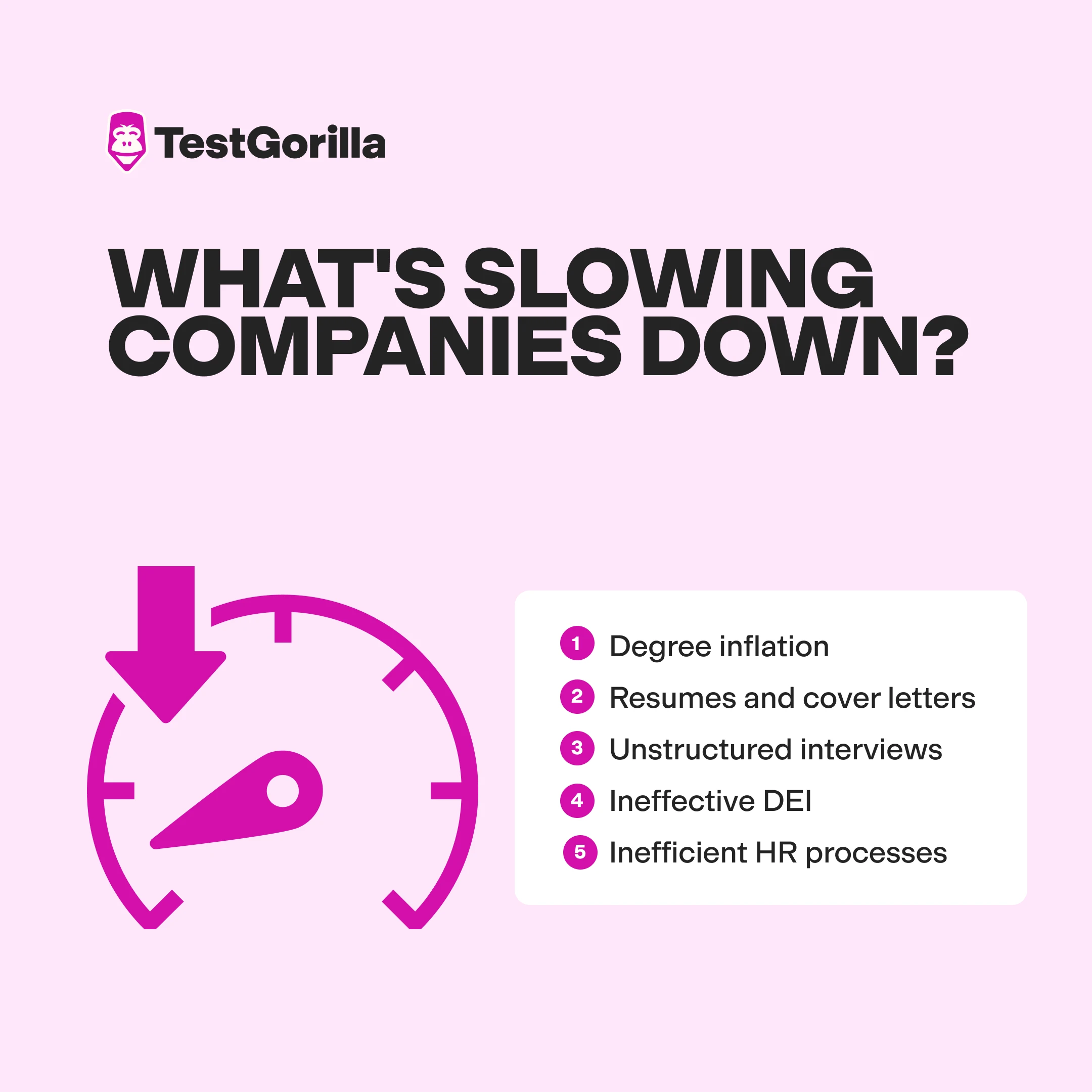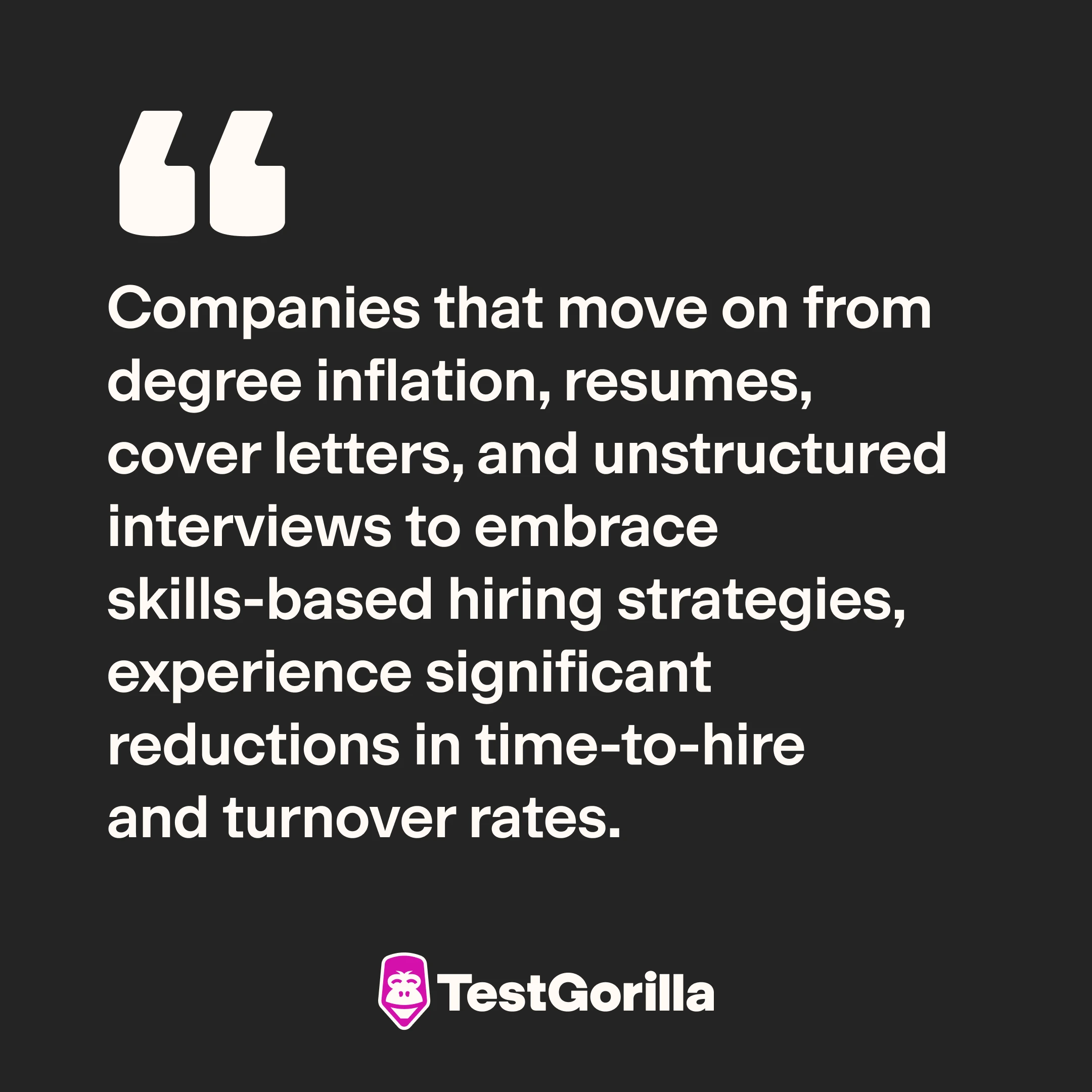It's safe to say that traditional hiring methods aren't saving time for anyone. Job seekers spend hours tweaking resumes, whilst recruiters spend their days sifting through them without gathering any relevant information about what a candidate’s actual skills are.
Skills-based hiring, however, cuts right to the chase. Assessing and hiring for a candidate’s skills by using multi-measure assessments is a proven way to hire faster – in fact, 82% of employers using skills-based hiring told us it reduced their time-to-hire.
Read on to find out how to hire faster with skills-based hiring.
Table of contents
What’s slowing hiring down?
Degrees, resumes, cover letters, unstructured interviews, outdated HR practices, selective DEI programs – all of these slow down the hiring process.
These unnecessary requirements eat away at an employer’s time and resources while providing little understanding, interpretation, or appreciation of a candidate’s skills. A resume, for example, might give you a window into a candidate’s experience, but it does not reveal much about what a candidate’s actual skills are.
Here's a list of 5 things that are preventing companies from hiring faster.
Degree inflation
Employers’ dependence on degrees as catch-all indicators of a candidate’s skills is known as degree inflation. Degree inflation slows companies down in several ways.
It ignores swathes of candidates who may have the desired skills but do not have degrees, resulting in more time spent searching for candidates who meet archaic degree requirements.
It increases the risk of hiring a less qualified candidate based on bias. When employers shrink the talent pool to only those candidates who can afford college, they are excluding more diverse candidates who did not attend college but may be more qualified for the position.
Hiring an unqualified candidate based on their degree can waste employers’ time finding, hiring, and training a replacement.
While degrees may contribute to candidate skills, they do not actually prove a candidate has those skills or can learn them. In fact, half of all workers in the U.S. are learning on the job or on their own to develop skills and transition to higher-paying work without ever having received a degree.
Resumes and cover letters
Resumes and cover letters aren’t all they’re cracked up to be. While they can be helpful tools for candidates to organize their work experience and educational background, they don’t measure a candidate’s hard or soft skills, and they waste companies’ time.
If hiring managers spend their limited time screening hundreds of resumes and cover letters, they are not using that time to assess candidates’ job-related skills.
We're not the only one who thinks resumes are a waste of time. According to a study by Glassdoor, 58% of 13,000 surveyed professionals said that cover letters are unnecessary.
When it came to recruiters, opinions were split. Some recruiters said it was worthwhile to take the time to read an applicant’s cover letter. Other recruiters said they despised the practice, labeling it obsolete.
According to Frank L. Schmidt, a psychology professor at the University of Iowa, resumes are actually the worst way to predict whether new hires will be successful.[1] Relying on such a faulty skills metric slows companies down.
Unstructured interviews
It’s common for technical jobs in research, engineering, and finance to require anywhere from two to seven interviews for a single position. Companies may feel that they are being thorough, but they are actually wasting time and money when implementing unstructured interviews.
Unstructured interviews waste time because they are also poor predictors of job performance. Here are four reasons why:
Predicting the future is quite difficult even when you have access to a lot of information about a candidate. But an interview only provides a tiny sample of interaction and reveals little about a candidate’s overall behavior.
Interviewers can’t tell when candidates provide random answers to interview questions.[2] In fact, research shows that most people lie in job interviews.[3]
Interviews favor extroverts when extroversion is not what most jobs require. So, interviewers inadvertently reward behavior that may not reflect what is required for the actual job.[4]
Research shows that these interviews are prone to confirmation bias. Most interviewers form an opinion about a candidate within the first ten seconds and spend the rest of the interview trying to confirm that initial opinion.[5]
In a 1998 meta-analysis by John Hunter, an American psychology professor, unstructured interviews were ranked as some of the worst assessments, predicting only 14 percent of an employee’s job performance.[6]
Ineffective DEI
Diversity and inclusion hiring is crucial to developing a business or brand that is ethical, flexible, and financially successful. But how you implement diversity in your hiring practice could be slowing you down.
DEI programs can backfire and end up diminishing the talent pool if their understanding of diversity is too limited. Programs that only focus on specific gender and racial diversity and ignore other categories like gender nonconformity, class, faith, upbringing, and physical/cognitive ability, are actually shrinking the talent pool and making it harder to find a qualified candidate.
Diversity without inclusion is also ineffective and time-consuming. Introducing qualified, diverse candidates into an environment where they do not feel included is not an effective way to retain employees.
On the other hand, if employees are nurtured, respected and properly motivated in an inclusive environment, there are lower turnover rates.[7] Retaining employees eliminates the need to go out and hire more employees, giving HR more time to focus on other tasks while saving companies money.
Inefficient HR processes
Inefficient HR practices, such as not having hiring software that centralizes all of your candidate information and documents, poor communication, and only placing job posts in a single place, can all have negative impacts on hiring speed.
These inefficiencies can result in recruiters ghosting qualified candidates, which slows hiring and can damage a company’s brand.
But according to Devon Lall-Perry, a former recruiter, recruiters who ghost are likely dealing with issues that have nothing to do with the candidate:
Recruiters may not have a true applicant tracking system in place, preventing them from keeping track of candidate conversations and stages
Recruiters may be uninformed about the ins and outs of a particular position and are unable to provide candidates with all of the necessary information
The company may have over-hired and implemented a hiring freeze without properly informing the recruiter
All of these factors indicate poor communication between the people involved in the hiring process, which wastes time for everyone.
4 reasons employers hire faster with skills-based hiring
Hiring faster has become even more critical to employers during the Covid-19 pandemic. In some instances, companies like Home Depot have sent job offers out only 24 hours after candidates apply.
Other employers have dropped their degree requirements, background checks, and experience requirements altogether. But this isn’t necessarily a good thing.
Increasing hiring speed shouldn’t mean filling open positions with anyone that is available. Ideally, increasing hiring speed should match speed with precision.
Skills-based hiring is understood as any hiring practice or practices that assess a candidate’s hard and soft skills through efficient tasks, metrics, and/or tests.
Data from our 2023 State of Skills-Based Hiring report shows that 82% of employers using skills-based hiring saw a reduction in time-to-hire. Let’s take a look at five reasons why skills-based hiring improves hiring speed.
1. Widens the funnel
Hiring for skills instead of degrees cuts the time it takes to assess a candidate’s skill set. Even companies like IBM, Accenture, and Dell have reduced their educational requirements for certain positions in favor of experience and skill requirements.
By widening the funnel to include candidates who do not have degrees, hiring managers can focus on testing candidates for relevant skills. Widening the funnel with skills-based hiring leads to a more accurate hire, saving you valuable time and resources that could have been wasted hiring the wrong person.
42% of employees told us they have trouble standing out from the crowd with their resumes. 57% of them are women.
Take Laura, for example. Laura is the head of customer success at TestGorilla. Having worked in recruitment, Laura had hands-on experience with the vices of resume-based hiring. She recalls having to shrink the hiring funnel at her old job by nit-picking things like resume formatting or files not being uploaded properly.
When Laura herself made a shift into the startup world, she encountered skills assessments that changed the hiring game for her. She admits that with only a resume she would have had no chance of landing a position at the startup.
2. Talent rises to the top
With a skills-based hiring approach, employers can begin the recruitment process with a skills assessment or scalable screening rounds. Tests happen simultaneously without requiring HR’s attention. Every candidate gets the same assessment and the grading process is automated for all candidates. This saves HR teams a lot of time.
The candidates with the most talent naturally spring to the top – no need to get bogged down in meandering cover letters. The test results say it all. The benefit for hiring managers is twofold: They get to do their jobs more efficiently, and they get to spend more time engaging with talented candidates.
3. Retention improves
Widening the funnel to include candidates with diverse backgrounds, transferable skills and the ability to learn new skills leads to benefits even after the candidate is hired. But widening the funnel to secure talent is only the first step. Employers need to set them up for growth and success.
If new hires stay and grow with the company, they are less likely to leave, freeing up recruitment efforts and saving time. Although this doesn't necessarily mean you hire faster, it means you hire less.
There's plenty of data to back this up. Here are a few stats from our State of Skills-Based Hiring report:
89% of employers using skills-based hiring increased employee retention
Employees hired via skills-based hiring are happier in their roles than those who are not
56% of employees prefer a skills-based hiring process
The State of Skills-Based Hiring 2024
Read TestGorilla's annual report to discover why over 81% of companies are choosing to adopt skills-based hiring methods in 2024.
4. Fewer mis-hires
According to a 2017 CareerBuilder Survey, 74% of employers say they hired the wrong person for a job.[9] Not so surprisingly, picking an unqualified candidate for the job can cost employers significant time and money.
Mis-hiring also means employers are wasting time onboarding, training, and managing the poor performance of unfit employees, on top of all of the time already spent reviewing their resumes, cover letters, and interviewing them.
According to our 2023 State of Skills-Based Hiring Report, 88% of companies reduced mis-hires hen using a skills-based hiring approach. Skills-based assessments can reduce mis-hiring and speed up the hiring process by:
Eliminating the guesswork that comes from processing resumes and focusing on university names or past career titles
Preventing recruitment bias – which is one reason why employers might miss out on top candidates. Skills-based assessments focus on the candidate’s skills instead of physical, cultural, or financial factors that are prone to bias.
Comparing candidate scores to benchmarks set by current employees to make sure that new hires can keep up with the quality of work that is being done by their peers.
Identifying where a candidate may fall short in one role, but may have the skills to succeed in another.
Hire faster and better with skills-based hiring
Skills-based hiring speeds up time-to-hire by dramatically reducing the time it takes to determine whether a candidate is right for a position.
Companies that move on from degree inflation, resumes, cover letters, and unstructured interviews to embrace skills-based hiring strategies, like skills assessments, trials, and behavioral interviews, experience significant reductions in time-to-hire and turnover rates. If you're interested in discovering more about how to use skills assessments in your organization, take a look at our article on which jobs are ideal for using skills-based hiring methods.
Ready to get started on a better hiring process? Book a free demo with our team to better understand what TestGorilla can offer, or sign up for a free plan to check out our platform for yourself. For more on skills-based hiring and time-to-hire, check out these case studies:
How TestGorilla reduced time to hire for SiddhiSai Web Solutions
How TestGorilla helped Hydroemission cut time to hire by 80%
Sources
Hunter, J.E.; Schmidt, Frank L. (1998). “The validity and utility of selection methods in personnel psychology: Practical and theoretical implications of 85 years of research findings”. Psychological Bulletin, 124(2), 262–274. Retrieved March 27th, 2023. https://doi.org/10.1037/0033-2909.124.2.262
Dana, Jason (April 8, 2017). “The Utter Uselessness of Job Interviews”. The New York Times. Retrieved March 27th, 2023. https://www.nytimes.com/2017/04/08/opinion/sunday/the-utter-uselessness-of-job-interviews.html?\_r=1
O’Connell, Andrew (June 3, 2013). “Vast Majority of Applicants Lie in Job Interviews”. Harvard Business Review. Retrieved March 27th, 2023. https://hbr.org/daily-stat/2013/06/vast-majority-of-applicants-li.html#:~:text=81%25%20of%20people%20in%20a,of%20the%20University%20of%20Massachusetts.&text=Participants%20in%20the%20study%20told,lies%20per%2015%2Dminute%20interview.
Nisbett, Richard (November 22, 2015). “Why job interviews are pointless”. The Guardian. Retrieved March 27th, 2023. https://www.theguardian.com/lifeandstyle/2015/nov/22/why-job-interviews-are-pointless
Bernieri, Frank J.; Gada-Jain, Neha; Prickett, Tricia J. (May 2000) “The Importance of First Impressions in a Job Interview”. Midwestern Psychological Association. Retrieved March 27th, 2023. https://www.researchgate.net/publication/313878823\_The\_importance\_of\_first\_impressions\_in\_a\_job\_interview
Hunter, J. E.; Hunter, R. F. (July 1, 1984). “Validity and utility of alternative predictors of job performance”. Psychological Bulletin, 96(1), 72–98. Retrieved March 27th, 2023.
Brown, Karen. (December 4, 2018). “To Retain Employees, Focus on Inclusion – Not Just Diversity”. Harvard Business Review. Retrieved March 27th, 2023. https://hbr.org/2018/12/to-retain-employees-focus-on-inclusion-not-just-diversity
Energy Job Search (February 17, 2021). “Transferable Skills Across Energy”. Oil and Gas Job Search. Retrieved March 27th, 2023. https://blog.oilandgasjobsearch.com/transferrable-skills-across-energy/
“3 in 4 Small Business Employers Have Hired the Wrong Person”. CareerBuilder. Retrieved February 15th, 2023. https://resources.careerbuilder.com/small-business/survey-3-in-4-small-business-employers-have-hired-the-wrong-person
Hennigan, Mel and Evans, Lindsay (October 31, 2018). “Does Hiring for ‘Culture Fit’ Perpetuate Bias?”. Society for Human Resource Management. Retrieved February 15th, 2023. https://www.shrm.org/hr-today/news/hr-magazine/1118/pages/does-hiring-for-culture-fit-perpetuate-bias.aspx
Related posts
Hire the best candidates with TestGorilla
Create pre-employment assessments in minutes to screen candidates, save time, and hire the best talent.
Latest posts
The best advice in pre-employment testing, in your inbox.
No spam. Unsubscribe at any time.

Hire the best. No bias. No stress.
Our screening tests identify the best candidates and make your hiring decisions faster, easier, and bias-free.
Free resources
This checklist covers key features you should look for when choosing a skills testing platform
This resource will help you develop an onboarding checklist for new hires.
How to assess your candidates' attention to detail.
Learn how to get human resources certified through HRCI or SHRM.
Learn how you can improve the level of talent at your company.
Learn how CapitalT reduced hiring bias with online skills assessments.
Learn how to make the resume process more efficient and more effective.
Improve your hiring strategy with these 7 critical recruitment metrics.
Learn how Sukhi decreased time spent reviewing resumes by 83%!
Hire more efficiently with these hacks that 99% of recruiters aren't using.
Make a business case for diversity and inclusion initiatives with this data.






















